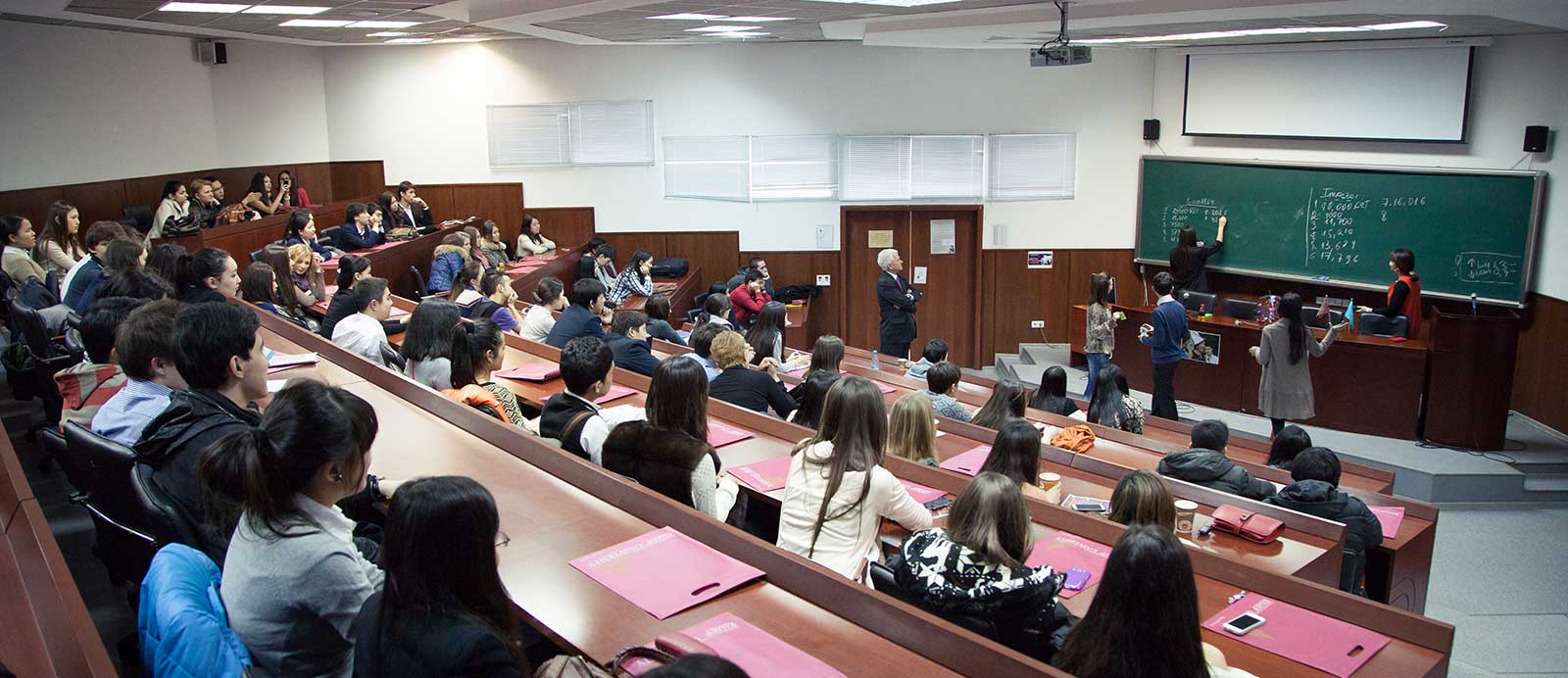Бакалаврға арналған Foundation бағдарламасы
Пәндер сипаттамасы
Foundation бакалавриат бағдарламасы – бұл ағылшын тілі ана тілі болып табылмайтын, ал ағылшын тілін білу және қолдану бірінші курста қалыпты ағылшын курстарына түсу стандарттарына сәйкес келмейтін студенттерге арналған курстар пакеті. Бағдарлама орта және университеттік білім арасындағы алшақтықты азайтуға бағытталған және оқушыларды академиялық пәндерді оқуға дайындайтын төрт тілдік дағдыларды (оқу, жазу, тыңдау және сөйлеу) дамытуға бағытталған. Оның мақсаты – өзін-өзі оқытуды және сыни тұрғыдан ойлау қабілетін ынталандыру.
Foundation C деңгейі (0 кредит)
Жалпы еуропалық тіл шеңбері: аяқталғаннан кейін A1
Курс – бұл бірінші курс студенттері өтуі керек деңгейлер жиынтығының бастапқы кезеңі болып табылады және тілді меңгерудің бастапқы деңгейіндегі студенттерге арналған. Бұл студенттердің қабылдау қабілетін (оқу және тыңдау), өнімді дағдыларды (жазу және сөйлеу) дамытатын және қарапайым грамматикалық құрылымдар мен сөйлем үлгілерін жақсы бақылауды дамытатын A1 деңгейіндегі интеграцияланған курс. Курс диктанттарды, күнделіктерді, жеке хабарламаларды/хаттарды және жеке ақпаратты қамтитын негізгі элементтерді жазуға бағытталған. Бұл курстың негізгі бағыты монологтарды таратуға, сондай-ақ бітірген мәтіні бар мәтіндерді қарқынды және кең оқуға бағытталған. Тыңдау дағдылары негізінен өзін-өзі оқыту тапсырмаларын орындау және сыныптағы өзара әрекеттесу арқылы дамиды. Нұсқаушы бірнеше жеке сабақтар өткізеді. Базалық деңгейдің соңына қарай студенттер CEF A1 деңгей критерийлерін қанағаттандырады.
Foundation B деңгейі (0 кредит)
Жалпыеуропалық тілдік шеңбер: аяқтағаннан кейін орташа В1
Ағылшын тілінің негізгі курсы бірінші курс студенттері өтуі керек деңгейлер жиынтығының екінші қадамы болып табылады және оқуға түсу кезінде A1+ деңгейі бар студенттерге арналған. Бұл курста топтық талқылаулар, жеке презентациялар, репродукциялар, сипаттамалық абзацтар мен эсселер жазу, әртүрлі тақырыптар бойынша ақпаратты тыңдау, бейнелер мен фильмдерді көру, тиісті деңгейдегі әңгімелер мен романдарды оқу сияқты іс-шаралар арқылы тілдік дағдыларды дамыту жалғасады. Ақпаратты талдауға және қорытындыларды тұжырымдауға, сондай-ақ мәтіндегі идеяларды нақты өмірлік тәжірибемен байланыстыруға ерекше назар аударылады. Пәннің соңына қарай ағылшын тілінің студенттері CEF B1 деңгейінде құзыреттілігін көрсетеді.
Foundation А деңгейі (0 кредит)
Жалпыеуропалық тілдік шеңбер: аяқтағаннан кейін орташа B2
Ағылшын тілінің негізгі курсы – бұл бірінші курс студенттері өтуі қажет деңгейлер жиынтығының үшінші кезеңі болып табылады және оқуға түсу кезінде студенттер В1 орта деңгейін меңгерулері тиіс. Бұл курс пікірталас, презентация, сөйлеу және топтық жұмыс сияқты іс-шаралар арқылы тілдік дағдыларды дамытуды жалғастырады; түйіндеме, даулы очерктер мен хаттар жазу; жаңалықтарды, қойылымдарды, фильмдерді және басқа да бейнефильмдерді тыңдау; және эсселерді, қысқа әңгімелерді, романдарды немесе публицистикалық кітаптарды, оқулық тарауларын және ғылыми және танымал мақалаларды оқу. Жазушылар мен спикерлер ретінде дамуға, сондай-ақ оқу мен тыңдау идеялары мен ақпараттарын пайдалануға баса назар аударылады. Курстың соңында ағылшын тілін үйренуде жеткілікті прогреске қол жеткізген студенттер CEF B2 деңгейінде құзыреттілігін көрсетеді.
АКАДЕМИЯЛЫҚ АҒЫЛШЫН ТІЛІ
ENG1110 Академиялық тыңдалым және жазба жасау (3 кредит; 5 кредит ECTS)
Пререквизиттер: ENG0005 Foundation ағылшын тілі 5-деңгей немесе KEPT/IELTS негізіндегі академиялық ағылшын тіліне тікелей рұқсат
Жалпыеуропалық тілдік шеңбер: аяқталғаннан кейін В2- төменгі С1 деңгейі
Бұл курс студенттердің тыңдалым мен жазба жасаудағы қабілеттерін дамытады, сонымен бірге тыңдаудың пассивті әрекет емес екендігіне кепілдік береді. Студенттер әр түрлі контексте, соның ішінде дәрістер мен формальды емес жағдайларда академиялық дискурсты түсінуді дамытады. Олар ағылшын тілінің әртүрлі диалектілерімен және формальдылық деңгейлерімен танысады. Олар жазбаларды жазу дағдыларын жетілдіреді, содан кейін бұл жазбаларды сұрақтар, жауаптар және түсіндіру сұраулары үшін негіз ретінде пайдаланады. Сонымен қатар, олардың жазбалары рефераттарды, презентациялар мен талқылауларды қайта қарау және дайындау мақсатында пайдалы болады. Фактілерді жай ғана айту басты мақсат болмайды. Керісінше, студенттер жауаптарын жазу және өздерінің сыни ойлауын дамыту үшін жазбаларын пайдаланады. Мүмкіндігінше, мұндай курстар үшін арнайы дайындалған жасанды материалдардың орнына шынайы аудио және бейнематериалдар қолданылады.
ENG1100 Академиялық сөйлеу (3 кредит; 5 кредит ECTS)
Пререквизиттер: ENG1110 академиялық тыңдалым және жазба жасау
Жалпы еуропалық тіл шеңбері: B2 аяқталғаннан кейін
Бұл курс студенттерге гуманитарлық ғылымдар, бизнес және әлеуметтік ғылымдар саласындағы әртүрлі академиялық тақырыптар бойынша сенімді және сенімді сөйлеуге көмектеседі. Студенттер өздері таңдаған тақырыптар бойынша ауқымды зерттеулер жүргізеді және осылайша ресурстарды дұрыс және этикалық пайдалану қабілеттерін дамытады деп болжануда. Бұл ретте олар өз тақырыптарын аналитикалық және терең пысықтаумен айналысатын және бір-бірінің сөйлеген сөздеріне қатысты сындарлы сын айтатын болады. Әрқашан сыни тұрғыдан ойлауға баса назар аударылады. Студенттер академиялық зерттеу кезеңдеріне қарағанда соңғы өнімге азырақ назар аудара отырып, академиялық сөйлеуге процестік тәсілді қолданады, олардың әрқайсысы сыныпқа шағын презентация ретінде ұсынылады. Олардың зерттеулеріне және соңында тақырыптарына арналған тұрақты презентациялардың арқасында студенттер тілді меңгеру деңгейін және академиялық контексте өз мүдделерін тиімді және сенімді түрде қорғау, сондай-ақ нақты деректер мен статистиканы өңдеу қабілетін арттырады. Сабақтар пікірталас, пікірталас және презентация түрінде өтеді.
ENG1120 Академиялық оқылым және жазылым 1 (3 кредит; 5 кредит ECTS)
Пререквизиттер: ENG0005 Foundation ағылшын тілі 5-деңгей немесе KEPT/ IELTS негізіндегі академиялық ағылшын тіліне тікелей рұқсат
Жалпы еуропалық тіл шеңбері: В2
Бұл курс студенттерге бағдарламаның академиялық оқу және жазу талаптарымен танысуға мүмкіндік береді. Курстың іс-шаралары негізгі идеялар мен нақты ақпаратқа шоғырлану, контексттегі пәндік салалардың лексикалық мағынасын тану және эссенің жеке стильдері мен құрылымдары шеңберінде жақсы зерттелген дәлелдерді анық білдіретін жазбаша жазуды үйрету арқылы жоғары деңгейде оқу қабілетін дамытады. Студенттер академиялық дискурс шеңберінде сыни ойлау қабілеттерін кеңейту үшін онлайн және баспа көздерін жауапкершілікпен және этикалық түрде қолдана отырып, өзін-өзі зерттеу дағдыларын игереді. Олар өз идеяларын нығайту және эсселерінде дәлелдемелерді ұсыну үшін пайдаланылуы мүмкін ақпарат пен түсіндірмелерді қамтитын тиісті оқылған мәтіндерді табуға және таңдауға үйренеді. Студенттер бұл ақпаратты өз дәлелдеріне қоспас бұрын оны өңдеп, сыни тұрғыдан талдауы керек. Соңғы өнімге қарағанда оқу және жазу процесіне және эссе жобаларына көбірек назар аудара отырып, жазу процесіне негізделген тәсіл қабылданады.
ENG1121 Академиялық оқылым және жазылым 2 (3 кредит; 5 кредит ECTS)
Пререквизиттер: ENG1120 академиялық оқу және жазу I
Жалпы еуропалық тіл шеңбері: аяқталғаннан кейін В2-С1 төмен
Бұл студенттер өздері таңдаған академиялық тақырып бойынша ірі ғылыми жобаны жүзеге асыратын оқу және жазу бойынша жетілдірілген академиялық курс. Алдыңғы курстарда алған ғылыми-зерттеу және жазу дағдыларына сүйене отырып, студенттер өздерін қызықтыратын салада айтарлықтай ауқымы бар жобаны таңдайды. Олар академиялық контекстке сәйкес критерийлерді қолдана отырып, тақырыпты таңдауда сенімді қорғауды ұсынады, содан кейін зерттеу жүргізуге дайындалады. Ғылыми эсселерін дайындау кезінде студенттер тақырыптың сипатына байланысты кітапханалық және онлайн ресурстарды, сондай-ақ сұхбат және кампустан тыс зерттеулер сияқты далалық зерттеулерді кеңінен пайдаланады. Оқу міндеттеріне әртүрлі дереккөздерді іздеу, талдау және бағалау кіреді. Кері байланысты жоспарлауға, баяндауға, әдебиеттерді зерттеуге, құрастыруға, өңдеуге, қарауға және сындарлы пайдалануға ерекше назар аудара отырып, құжаттарды құрастыруға процестік тәсіл қолданылады. Құрдастарының да, нұсқаушылардың да пікірлеріне назар аударылады. Соңғы кезеңде редакциялауға, дәйексөзге және библиографиялық компоненттерге назар аударылады.





